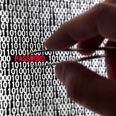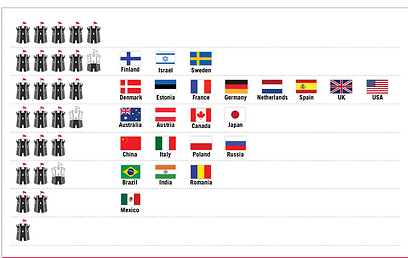
(Illustration)
Photo: Shutterstock
A recent report by the Security and Defense Agenda (SDA) and McAfee concluded that Israel
enjoys significant cyber-readiness.
The Brussels-based SDA is a specialist cyber-security and defense think-tank. McAfee, an Intel subsidiary, is considered the world’s largest security technology company.
Related stories:
- NCC holds first cyber terror drill
Kuwaiti imam: Cyber jihad effective
Analysis: Cyber vandalism – not warfare
The report, titled "Cyber-security: The vexed question of global rules," explored cyber-readiness around the world. It gave Israel a score of 4.5 stars – higher the one given to the United States, which was awarded four stars.
- For the full report click here
"Israel has a national CERT (Computer Emergency Response Team), participates in the informal CERT communities, has a cyber-strategy and a cyber command," the report said.
The report reviewed 23 countries. Israel topped the report alongside Sweden and Finland; the United States, Britain, Germany and France scored four starts each, Canada, Australia and Japan received 3.5 stars, China and Russia were given three stars, Brazil and India got 2.5 starts and Mexico closed off the list with only two stars.

The ranking
Lars Nicander, director of the Center for Asymmetric Threat and Terrorism Studies (CATS) at the Swedish National Defense College (SNDC) was quoted by the authors as saying that Israel – alongside Russia and China – also initiated the most cyber attacks against its enemies.
- For full coverage of the cyber attack on Israel click here
Prof. Isaac Ben-Israel, head of the Israel National Council for Research and Development and former senior cyber-security advisor to Prime Minister Benjamin Netanyahu, was quoted as saying that Israel is subjected to as many as 1,000 cyber attacks per minute, but qualified that such attacks obey certain hierarchy.
According to Ben-Israel, the real threat to Israel is not posed by hackers such as "Anonymous," but rather by other countries and criminal organizations.
"A cyber-war can inflict the same type of damage as a conventional war. If you want to his a country severely you hit its power and water supplies. Cyber technology can do this without shooting a single bullet," he said.
"The most vulnerable target for cyber-attacks is a country's critical infrastructure – power, water, telecommunications, transport, hospitals and banks.
"In most countries, these assets are in private hands, so the challenge now is to develop a strong private-public partnership to secure these systems and to convince people to make the investment."
Israel, he added, "is formulating national policies to actively respond to cyber attacks."
- Receive Ynetnews updates
directly to your desktop















